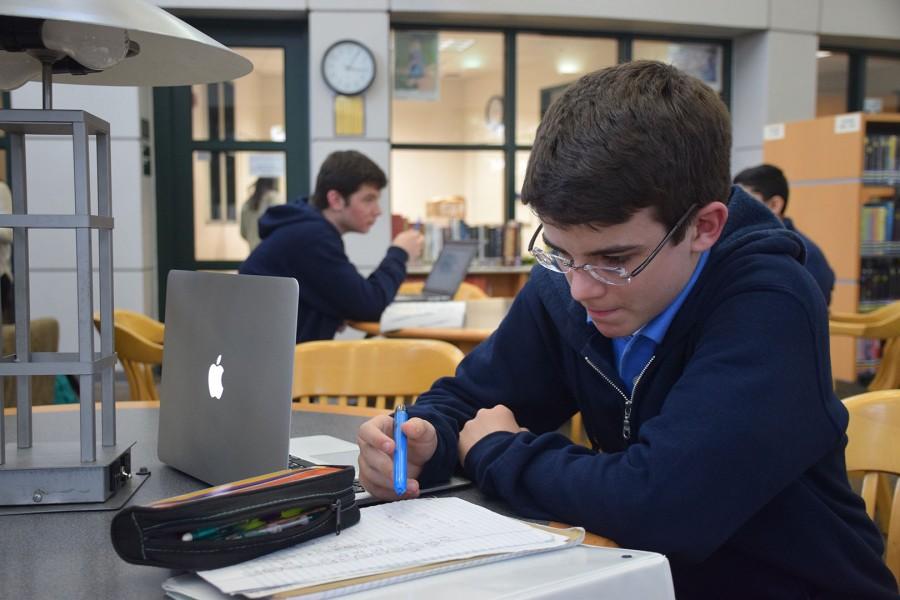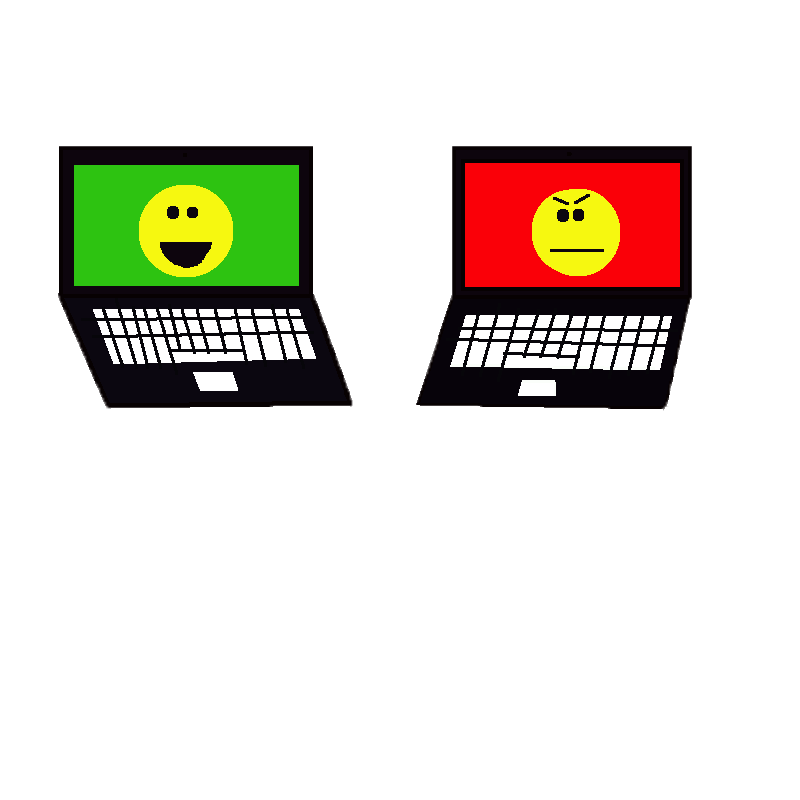The pitter-patter of the keyboards echoes through the physics classroom as teacher Mike Arney frustratingly tries to solve a homework problem. Among the numerous laptops open, Facebook, Gmail, YouTube and Pinterest flash on the screens, enveloping the students. When Mr. Arney finishes the problem and asks for questions, a silence pervades the room, while all eyes are glued to the screens.
This year, Arney, like many other teachers, has begun to discourage laptops in his classroom. Although we like to tout that we need a one-to-one initiative and have modernized with the real world, we need to reconsider laptops for educational purposes. Online classes and online exercises for educational purposes provide an unprecedented expansion of information. However, permitting laptops for note-taking can be a threat to educational excellence.
Recently, colleges across the country, previously welcoming laptops in the classroom, have begun to ban laptops in lectures because they pose an irresistible distraction to students. To ensure “the value of the classroom experience,” the University of Chicago has even banned wi-fi access in most classrooms.
Because our school is a college preparatory school, more teachers should consider banning the use of laptops for note-taking in classrooms and switch to the old reliable pencil and paper. Students are too easily distracted by laptops, and traditional note-taking methods are superior.
“I realized when so many college professors are banning laptops, students have to take notes [by hand]. Students have to be ready for that,” English teacher Susan Lilley said. “I don’t think students should have to go through high school with only one method and then be shocked when they are told not to bring laptops to college classrooms.”
As much as we would like to say otherwise, laptops are extremely distracting because they have always been prioritized as portals of instant messaging and gaming rather than educational instruments.
In a Vermont study, during 65 different lectures, an average of two-thirds of student laptops were deemed “distractive” (checking social media or surfing non-course-related websites).
Similarly, in a landmark Cornell University study called “The Laptop and the Lecture,” during a lecture, half of the class was permitted unfettered access to laptops while the other half was not. Regardless of the kind or duration of computer access, disconnected students performed substantially better on a quiz based on the lecture.
“I think [the laptop] has hindered school performance. In some classes, I have returned to taking notes on paper, and that seems to have helped retention,” junior Jacob Goldberg said.
Furthermore, taking notes on the laptop without any distractions (an incredible feat) can still hinder student performance. In a Princeton University study, students who took notes through laptops and did not get off task, had a shallower understanding of course material and performed significantly worse on conceptual questions.
“I can write slightly faster on the computer, but it’s a lot easier to get distracted,” Goldberg said.
According to The New Yorker, the act of typing turns students into machines who don’t think. The traditional pencil-pusher approach kindles an exciting process of integration and forces students to pay attention and to completely write down the most important materials.
Although teachers should consider preventing laptops for note-taking, laptops shouldn’t be totally disregarded in the education system.
“A great tool is to take notes [by hand] and pair with somebody to write them up on laptops. That will increase knowledge and memorability,” Lilley said. “Additionally, in collaborative work and research, the laptop has been a godsend.”
To integrate complex models in math, to access prestigious journals for research in the classroom and to provide completely online classes, laptops should remain a part of the education system and shouldn’t be banned from the school altogether.
“Laptops are definitely useful when you want to look through powerpoints, images or diagrams,” junior Sylvia Choo said. “There has many been a time when the Evernote app has been my savior for Latin convention testing.”
More teachers need to take the responsibility to reduce laptop note-taking to help students absorb class material and prepare them for college. In addition, knowing the negative ramifications, students should discipline themselves to avoid taking notes with laptops as much as possible.
Laptops open thousands of doors, but some of them must be shut to realize the full, technological potential of laptops.
Pulling the plug with note-taking on laptops
Categories:
0
Navigate Left
-
 EditorialsDress to Impress
EditorialsDress to Impress -
 EditorialsSchedule Lacks Class
EditorialsSchedule Lacks Class -
 EditorialsAn Active Problem
EditorialsAn Active Problem -
 EditorialsFeedback Reform
EditorialsFeedback Reform -
 EditorialsOut of Service
EditorialsOut of Service -
 EditorialsAll Action, No Talk
EditorialsAll Action, No Talk -
 EditorialsPhony Solution
EditorialsPhony Solution -
EditorialsTime for a Change
-
EditorialsFundraising Fatigue
-
 EditorialsCulture War Hits Home
EditorialsCulture War Hits Home -
 OpinionsHome Away from Homework
OpinionsHome Away from Homework -
 OpinionsPlaque Attack
OpinionsPlaque Attack -
 OpinionsHot Topic
OpinionsHot Topic -
 OpinionsRepresentation Made Real
OpinionsRepresentation Made Real -
 OpinionsOppression On Every Plate
OpinionsOppression On Every Plate -
OpinionsGrade A Problem
-
OpinionsCommentaaron
-
OpinionsCommentaaron
-
OpinionsCommentaaron
-
 OpinionsDeliver on Diversity
OpinionsDeliver on Diversity
Navigate Right
About the Contributors

BRIAN MIN, OPINIONS EDITOR
Brian Min is a senior at Trinity Prep and is the opinions editor for the Trinity Voice. He has been on the Trinity Voice staff for two years. With his articles about educational policy and politics, Brian (Byung Ju) strives to bring honor to his family. Contact at [email protected].

Shea Perera, Managing Editor
Shea Perera is a senior who is enthusiastic to be the Managing Editor. This is her third year on The Trinity Voice. She enjoys playing tennis and playing the piano. On the weekends, she swims with her dolphin friends at the beach. In her free time, she carefully attends to her succulent plants making sure they stay alive.




